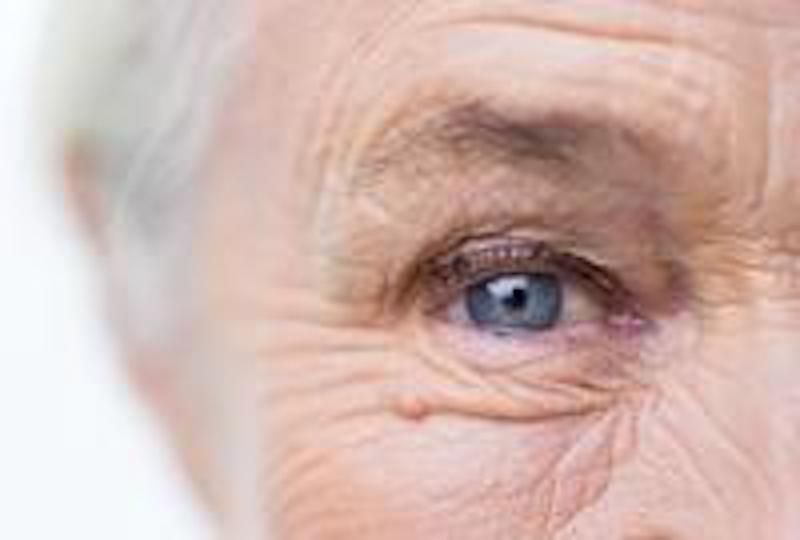- Center on Health Equity & Access
- Clinical
- Health Care Cost
- Health Care Delivery
- Insurance
- Policy
- Technology
- Value-Based Care
Gene Therapy Well Tolerated in Wet AMD, Shows Promise in Visual Acuity
A single injection of a gene therapy was well tolerated and showed the potential to control exudation in patients with neovascular age-related macular degeneration (wet AMD).
A single subretinal dose of a gene therapy was not only well tolerated among patients with neovascular age-related macular degeneration (nAMD), but there was sustained expression of the RGX-314 protein for at least 2 years, showing the potential to control exudation. The results of the phase I/IIa dose escalation trial were published in The Lancet.1
Age-related macular degeneration (AMD) causes vision loss that can turn into partial blindness.
Image credit: Syda Productions - stock.adobe.com

RGX-314, also known as ABBV-RGX-314, is an adeno-associated virus serotype 8 vector that provides potential continuous suppression of VEGF-A. nAMD, also called wet AMD, causes faster vision loss than AMD and, while it doesn’t cause complete blindness, can cause patients to lose central vision.2
Real-world outcomes of long-term nAMD treatment have been inferior to those seen in clinical trials because of undertreatment or nonadherence with visits for injections. “Therefore, there is strong motivation to develop treatments that provide sustained suppression of VEGF-A,” the authors explained.
The open-label, multiple-cohort, multicenter, phase I/IIa, dose-escalation study was conducted at 8 sites in the US with 68 patients. On day 1, all patients received intravitreal ranibizumab. At week 2, 42 who demonstrated the required anatomic response received a subretinal injection of RGX-314. There were 5 different doses being evaluated with 12 patients placed into each cohort based on dosing. The mean (IQR) age at baseline was 80 years (74-85), nearly all (41 of 42) patients were White, and 52% were female.
While all patients experienced at least 1 treatment-emergent adverse event (TEAE), most were grade 1 or 2. The most common TEAEs were postprocedure conjunctival hemorrhage and retinal pigmentary changes. There were also 7 instances of a retinal degeneration event, which were mostly grade 1, typically occurred 6 to 12 months after the gene therapy was administered, and had not resolved at the end of the study.
In 9 of 46 study eyes, reduced visual acuity was reported, although 6 of these were mild or moderate and deemed unrelated to RGX-314. However, the other 3 events were possibly related to the therapy.
The mean baseline best-corrected visual acuity (BCVA) was maintained or improved in 4 of the 5 cohorts, while cohort 1, which received 3x109 genome copies per eye, experienced a gradual reduction in BCVA over time. Patients in cohorts 3 through 5 who did not receive any supplemental anti–VEGF-A injections throughout the last year of the study maintained or improved baseline BCVA.
"The publication of the ABBV-RGX-314 Phase I/IIa trial results in The Lancet reinforces the encouraging long-term clinical data observed using subretinal delivery and underscores the potential of ABBV-RGX-314 gene therapy to offer a new approach to the clinical management of wet AMD," Jeffrey S. Heier, MD, director of the Vitreoretinal Service and director of Retina Research at Ophthalmic Consultants of Boston, and primary investigator for the trial, said in a statement.3 "Wet AMD is a chronic, life-long disease and real-world evidence shows patients are losing significant vision over time, and the burden of frequent anti-VEGF injections needed to manage their wet AMD is a major reason why. A single treatment of ABBV-RGX-314 that can potentially provide long-lasting treatment outcomes and a strong safety profile would offer a novel approach to treating this serious and blinding disease."
In an interview4 ahead of the Angiogenesis, Exudation, and Degeneration 2023 meeting, Charles C. Wykoff, MD, PhD, director of research at Retina Consultants of Texas; chair of research, Retina Consultants of America; and deputy chair of ophthalmology for the Blanton Eye Institute, Houston Methodist Hospital; and coauthor on the study, explained that a gene therapy for the most common cause of irreversible blindness “would be a tremendous step forward for the opportunity for management of this chronic disease.”
He also noted that while gene therapy “holds the promise of being one and done,” data have shown that some patients do need ongoing therapy.5
"Even if we are using gene therapy, it's important to realize that these patients will continue to need retinal care and retinal follow-up," he said. "You're looking for signs of efficacy, you're monitoring them for safety, you're making sure that they get any retreatments if they need them. Of course, there's a host of other retinal issues that may come up in these patients. They're going to continue to need retina care, certainly, even in the context of gene therapy."
Reference
1. Campochiaro PA, Avery R, Brown DM, et al. Gene therapy for neovascular age-related macular degeneration by subretinal delivery of RGX-314: a phase 1/2a dose-escalation study. Lancet. 2024:S0140-6736(24)00310-6. doi:10.1016/S0140-6736(24)00310-6
2. Age-related macular degeneration. National Eye Institute. June 22, 2021. Accessed April 12, 2024. https://www.nei.nih.gov/learn-about-eye-health/eye-conditions-and-diseases/age-related-macular-degeneration
3. REGENXBIO announces Lancet publication of phase I/IIa study evaluating ABBV-RGX-314 as a one-time gene therapy for wet AMD. REGENXBIO. News release. March 28, 2024. Accessed April 12, 2024. https://regenxbio.gcs-web.com/news-releases/news-release-details/regenxbio-announces-lancet-publication-phase-iiia-study
4. Joszt L. Dr Charles Wykoff: gene therapy for wet AMD would be a tremendous opportunity. The American Journal of Managed Care®. May 21, 2023. Accessed April 12, 2024. https://www.ajmc.com/view/dr-charles-wykoff-gene-therapy-for-wet-amd-would-be-a-tremendous-opportunity
5. Joszt L. Dr Charles Wykoff discusses gene therapy to treat wet age-related macular degeneration. The American Journal of Managed Care®. April 23, 2023. Accessed April 12, 2024. https://www.ajmc.com/view/dr-charles-wykoff-discusses-gene-therapy-to-treat-wet-age-related-macular-degeneration
